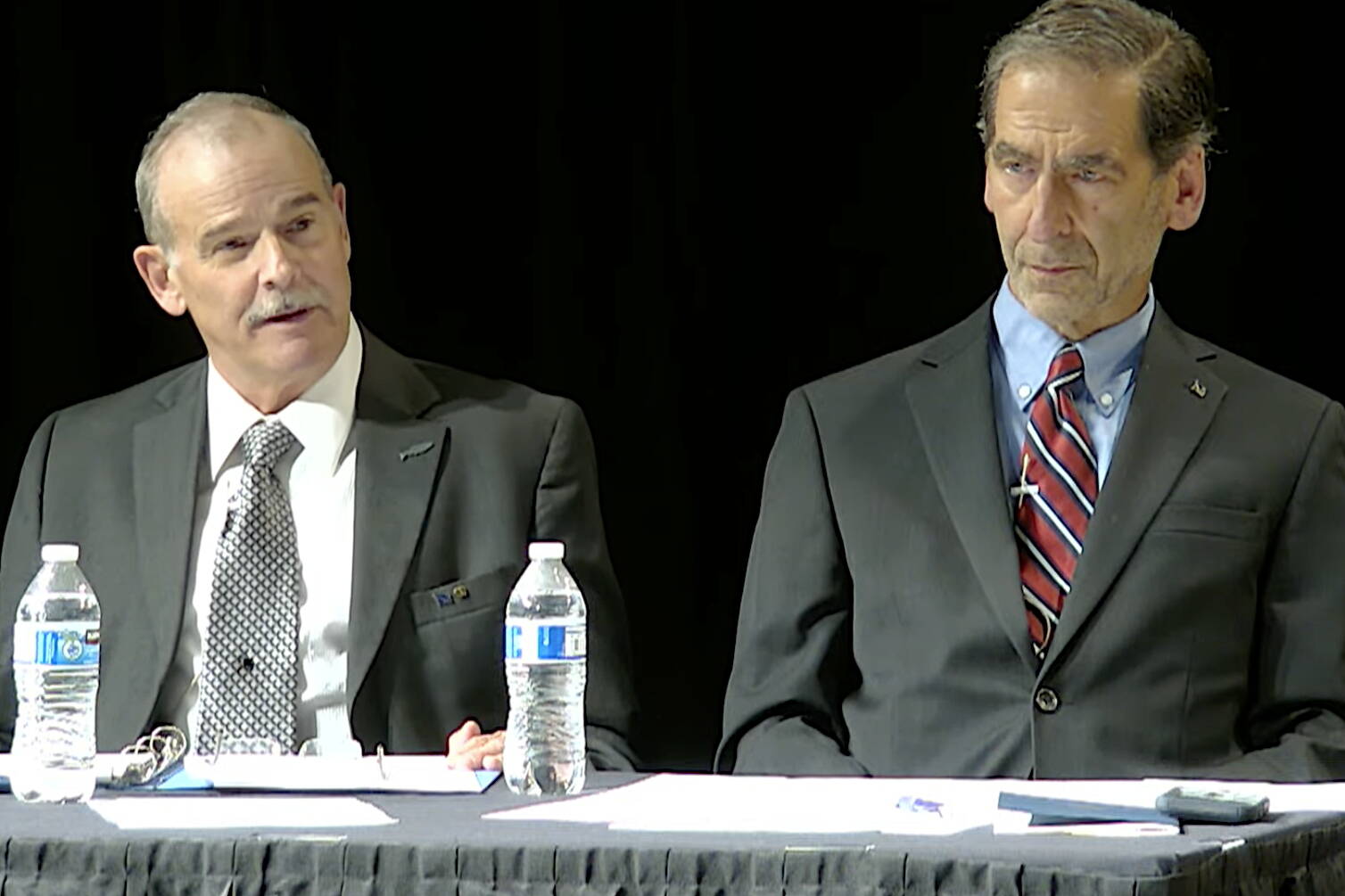“I believe this discussion will generate far more heat than light” an introductory speaker remarked which, while perhaps an accidental reversal of meaning, ended up being the reality for much of a debate Thursday night about a constitutional convention Alaskans will vote on in the November general election.
The two debaters (one in particular) favoring the convention sounded alarms about allegedly lawless government running amok at all levels, while the two debaters opposed mostly expressed general alarm about the many uncertainties approving the ballot measure will supposedly create.
But while the 90-minute clash at the University of Alaska Anchorage that can be seen on Alaska Public Media sites might not change many informed minds, it did also present a full history of Alaska’s constitutional creation and the issues likely to arise with a rewrite of the document via the convention process. A vote on a convention is required by law at least every 10 years, but none have occurred since statehood since voters have nearly always voted decisively in opposition.
Proponents of a convention, during the debate and fall campaign, consistently accuse opponents of fear-mongering with dire predictions of a radical agenda that will strip Alaskans of rights such as the privacy clause that protects, among other things, legal abortion.
“We are not running for office, we’re not going to try to score debating points and we’re not going to try to face hostile questions from the journalists,” Bob Bird, chairman of the Alaskan Independence Party, said while delivering the opening remarks for the pro-convention debaters. “We’re here to speak to Alaskans to allow them to make up their own minds and to think for themselves.”
In remarks repeated a few time during the evening, Bird also said the Alaska State Legislature’s refusal to fund a “full Permanent Fund Dividend” in recent years “is the engine that is pulling this Con Con train” and his yes-vote efforts wouldn’t exist otherwise.
Harm caused by uncertainty to residents, businesses and others if the ballot measure passes was invoked in virtually every remark by the anti-convention debate participants.
“If we go down this road we can’t and they can’t control what this process looks like or what comes of it,” said Joelle Hall, president of the Alaska AFL-CIO.
While Hall brought up abortion and Bird the PFD as early issues of focus, the debate pivoted to a wade range of issues that might get included in a constitutional rewrite, with anti-convention spokesperson Matt Shuckerow suggesting they could include fringe items such as eliminating borough governments and forcing the state to use gold as currency.
Bird immediately retorted with one of his numerous, sometimes shouted, proclamations during the evening.
“My goodness, if we had sheriffs the Huepers would not have been raided in Homer by a renegade FBI,” he said, referring to a search in April last year related to the Jan. 6 U.S. Capitol riot in an apparent mistake. “The sheriffs are the final say and final authority in a county. I think Alaska’s boroughs have outgrown their usefulness and we have to move to Anglo-Saxon common law with counties. And the gold and silver thing? Don’t criticize me for that. It’s in the U.S. Constitution and it’s been ignored for a long time.”
The cooler contribution to Bird’s heated yes-vote arguments were made by former Lt. Gov. Loren Leman, who spent much of the debate discussing the processes of a convention and supposed safeguards ensuring residents won’t be railroaded into radical results they don’t favor.
“We believe Alaska voters will be thoughtful in selecting delegates and the delegates will be diligent,” Leman said. He asked if Alaskans believe they are better off, and “more free and more prosperous” than 10 years ago, and a constitutional convention means “the benefit to Alaska will far surpass the cost of this investment.”
A video news report shown at the beginning of the debate states a convention would cost $16 million, according to one estimate.
“You open up the constitutional convention to have a debate about the PFD that’ll take five or six years…to produce a decision that will go to the voters that they can vote up or down,” Hall said. “Meanwhile, investment goes away. Meanwhile we don’t know what our rights our. Meanwhile nobody knows what the rules of the road are while we’re having this conversation.”
Bird said it’s lack of clarity about constitutional rights — and violations “in so many ways I won’t bore you” – that are a primary reason a convention is essential.
“Both the (state) executive and legislative branches have ignored their oath to defend the Constitution by refusing to use their superior power over the judiciary to halt their brazen and numerous overthrows of the Constitution,” he said. “And now election integrity creates a pall over our state.”
Adding what could be seen — literally — as perceived weight to the sometimes factually challenged assertions by Bird and other debaters were occasional full-screen slides highlighting their claims, such as one during one of Bird’s remarks declaring in large letters “the federal government does NOT obey its own Constitution.”
Lori Townsend, news director for Alaska Public Media and the debate’s moderator, said the debaters “asked to include their own material (and) we told them they had that option.” But she said she didn’t see what was on the slides before or during the debate, which is something APM will likely reconsider for future debate broadcasts.
“I wasn’t aware of what they were going to display,” she said. “We should have said we need to see them first.”
A telephone poll of audience members — both attending in person and watching/listening remotely — during the immediate minutes after the debate resulted in 23% voting in favor of a convention and 74% opposed. That result is far more lopsided than a poll released Friday showing 30.8% in favor, 53.8% opposed and 15.3% opting for “I wouldn’t vote.”
• Contact reporter Mark Sabbatini at mark.sabbatini@juneauempire.com

